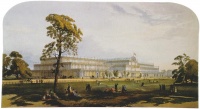1850s
From The Art and Popular Culture Encyclopedia

|
Related e |
|
Featured: |
Art and culture
Literature: Les Fleurs du mal (1857) - Madame Bovary (1857) - Artifical Paradises (1850s) - The Origin of Species (1859)
Events and trends: rise of photography as an art form - the Great Exhibition (UK world fair) - invention of pulp paper - first purpose-built music halls - start of "industrial design" - start of modernism
The Crystal Palace (1851) - Joseph Paxton
Poem of the Soul, Nightmare (1854) - Louis Janmot (1814-1892)
Great Day of His Wrath (1851-53) - John Martin
Fading Away (1858) - Henry Peach Robinson
“The degenerate human being, if he is abandoned to himself, falls into a progressive degradation. He becomes…not only incapable of forming part of the chain of transmission of progress in human society, he is the greatest obstacle to this progress through his contact with the healthy proportion of the population.” Bénédict Augustin Morel, Treatise on the Physical, Intellectual and Moral Degeneration of the Human Race, 1857
Wood pulp [...]
Around 1850, a German named Friedrich Gottlob Keller crushed wood with a wet grindstone to obtain wood pulp. Further experimentation by American chemist C.B. Tilghman and Swedish inventor C.F. Dahl enabled the manufacture of wood pulp using chemicals to break down the fibres. --http://en.wikipedia.org/wiki/Wood_pulp#History [Nov 2005]
Variety Shows, Music Hall Entertainment, and Dance Halls
Music Hall is a type of British theatre which had its start in the public "song and supper" rooms of the 1850s. It flourished from the 1890s to the Second World War, when other forms of popular music evolved and it began to be replaced by films as the most popular form of entertainment.
British Music Hall was similar to American vaudeville, featuring rousing songs and standard jokes, while in the United Kingdom the term vaudeville referred to more lowbrow entertainment that would have been termed burlesque in the United States.
- The Stones of Venice
- Haussman begins redesign of Paris, creating boulevards
*James Whistler, American artist, is one of many artists who flow into Paris after having read Murger's accounts
- New Orleans legalizes licensed prostitutes
- Olmsted's design for New York's Central Park
- Darwin's Origin of the Species published
Births
- Guy de Maupassant (1850 - 1893)
- Robert Louis Stevenson (1850 - 1894)
- Jose Posada (1851 - 1913)
- Antoni Gaudí (1852 - 1926)
- Vincent van Gogh (1853 - 1890)
- Oscar Wilde (1854 - 1900)
- Arthur Rimbaud (1854 - 1891)
- H. Rider Haggard (1856 - 1925)
- Max Klinger (1857 - 1920)
- Émile Durkheim (1858 - 1917)
- Henri Bergson (1859 - 1941)
- Havelock Ellis (1859 - 1939)
Deaths

